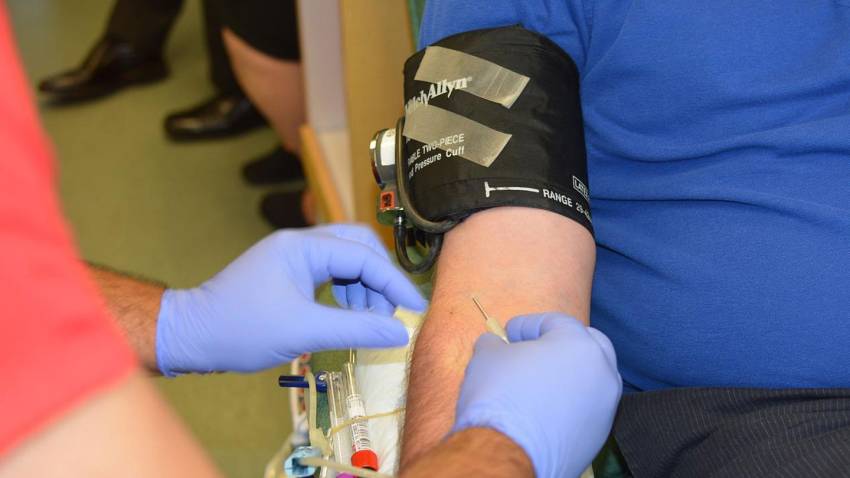Can Diabetics Donate Blood? Here’s What You Need to Know

New Delhi : Are you a diabetic? Do you ever wonder if diabetics can donate blood? Well, most of the time, it's safe for people with diabetes to give blood. If you have either type of diabetes, i.e., type 1 and 2, you can still donate blood. But before giving blood, you should be in excellent health overall and have the condition under control.
Keeping your blood sugar range at an optimum level if you have diabetes is essential. Watching the blood sugar range throughout the day is vital, ensuring you eat well and exercise enough. Living a healthy lifestyle may help you keep your blood sugar levels normal. To help you control your diabetes, your doctor will prescribe a few medicines. You should be able to give blood without being affected by these drugs.
Can diabetics donate blood? If you are still unsure, visit a doctor before doing so. Your doctor will answer all your doubts and help you determine if that's the optimal choice for you.
Diabetes and Blood Donation
If you have prediabetes and have never had any cardiac issues, you are still eligible to give blood.
Insulin and Blood Donation
Most insulin-dependent individuals with type 1 or 2 diabetes are prohibited from giving blood. If an insulin user happens to donate blood, they run the risk of health problems. Because of this, insulin-dependent individuals are not allowed to give blood. Both conventional insulin injection users and those using insulin pump treatment should be aware of this.
Blood Donation and Diabetes Medication
You may donate blood if your diabetes prescription has not been modified in the past four weeks. However, if your doctor has made changes to your diabetes medication, you should ask your doctor before deciding to donate blood.
Also, you can't donate blood if you are a diabetic and prescribed bovine insulin and blood thinner such as warfarin. Bovine insulin, which comes from cows, has a risk of Mad Cow Disease transmission. You won't be qualified to donate blood, even if you haven't used bovine insulin in years or decades.
Blood thinner warfarin is often used to manage excessive cholesterol, but it may also assist in lowering blood sugar levels. Blood donation while using a blood thinner is neither safe nor permitted. Never cease taking a prescription drug to become eligible to give blood.
Can Diabetic People with Heart Conditions Donate Blood?
You cannot give blood if you have diabetes or cardiac problems, along with the following issues:
● Experienced dizziness and lightheadedness due to cardiac issues
● Experienced heart failure
● Had an amputation performed as part of an operation for clogged or constricted arteries
Who Is Qualified to Donate Blood?
You may give blood if you meet the following requirements:
● You are in a good health
● Your blood pressure is in the normal range
● Your body weight is at least 49.8 kg
● Your haemoglobin is in the normal range
● Your age is between 18 years and 60 years
● Your HbA1c level is between 6 and 6.4%
● You are not relying on insulin injections
You are not qualified to give blood if:
● You take insulin regularly
● You had insulin therapy in the past four weeks
● You experienced cardiac failure
● You are still receiving treatment, being monitored, or being followed up for renal impairment
● You had blood vascular surgery or had a leg amputated
● You often feel dizzy or faint
If you want to donate blood, you must confirm that none of the above instances applies if you have been taking the exact dosage of an oral or injectable prescription for four weeks or longer.
Diabetes Blood Donation Tips
Try to maintain a sugar level within the usual range as indicated by the medical care team in the days following your donation. All blood donors should drink lots of water the days leading up to and after their blood donation, and get plenty of rest the night before.
Following a blood donation, a diabetic patient should do the following:
● Watch your blood sugar range
● Eat a nutritious diet
● For 24 weeks after your donation, consume iron-rich meals or a supplement
● Contact your doctor immediately if you feel ill or are worried about your wellness after giving blood
Conclusion
With all the above information, you must be able to answer, can diabetics donate blood?
Remember that donating blood reduces unfavourable iron deposits in the body, which helps fight cardiovascular disease. Blood donation also reduces stress and improves mental health.
You should be able to give blood often, even if you have stable diabetes. You may donate once every 56 days if your sugar level is within the normal range. Consult your doctor if you have any unpleasant symptoms after giving blood.








